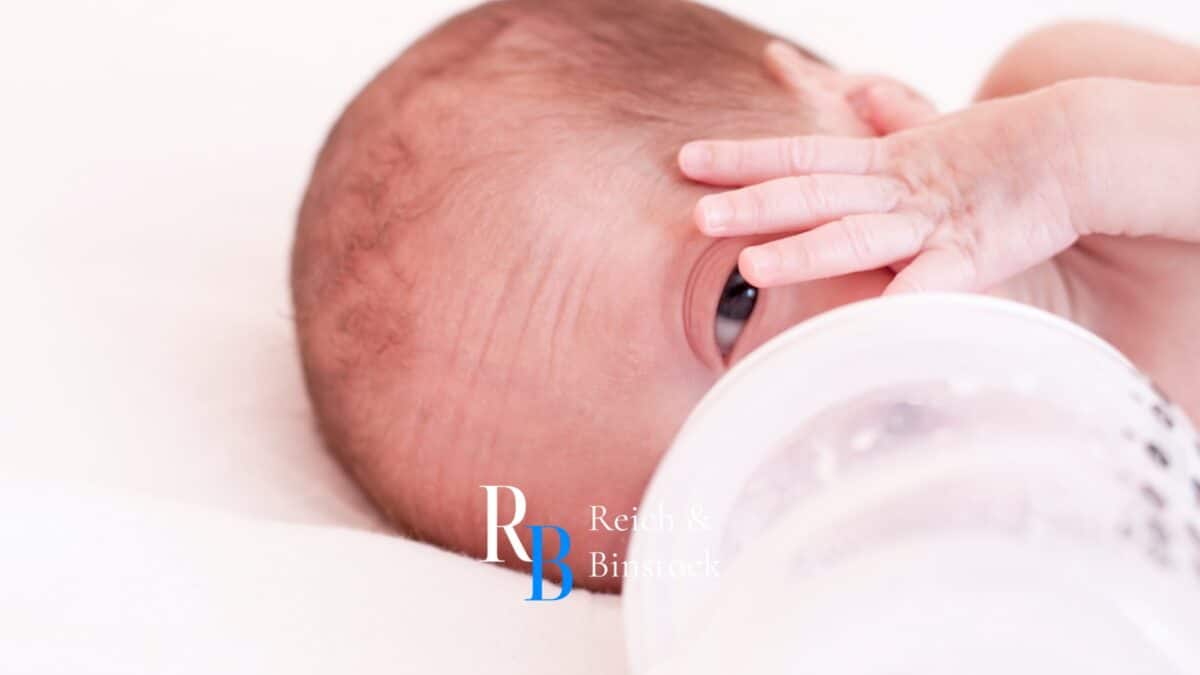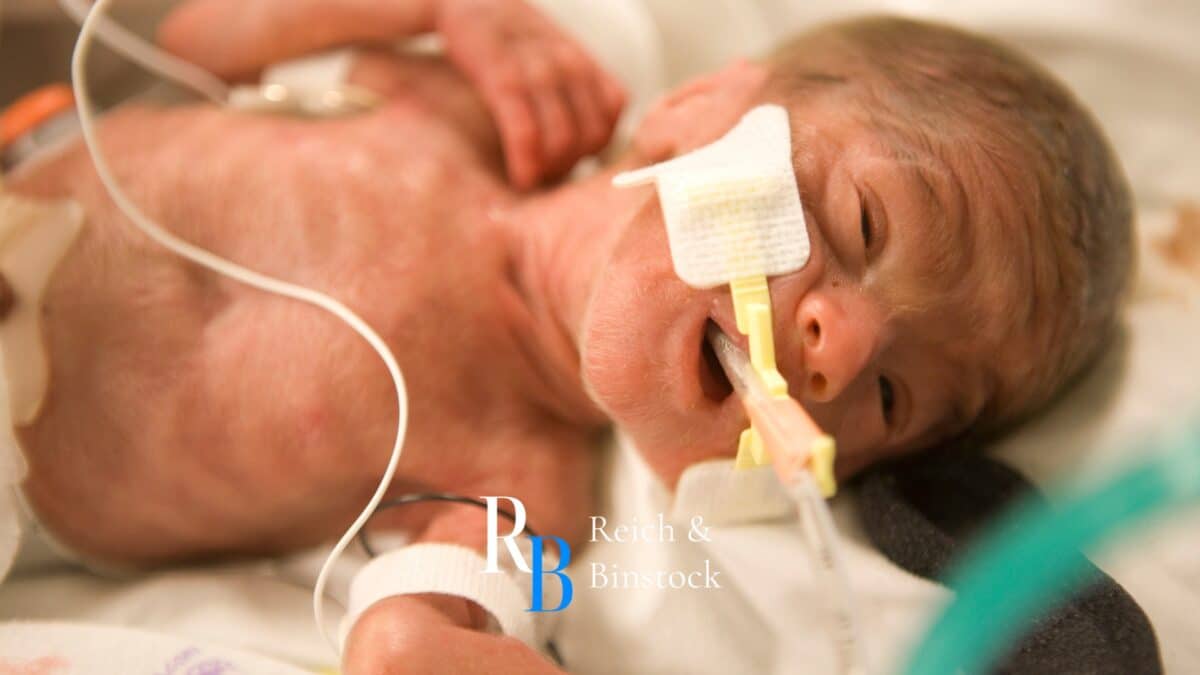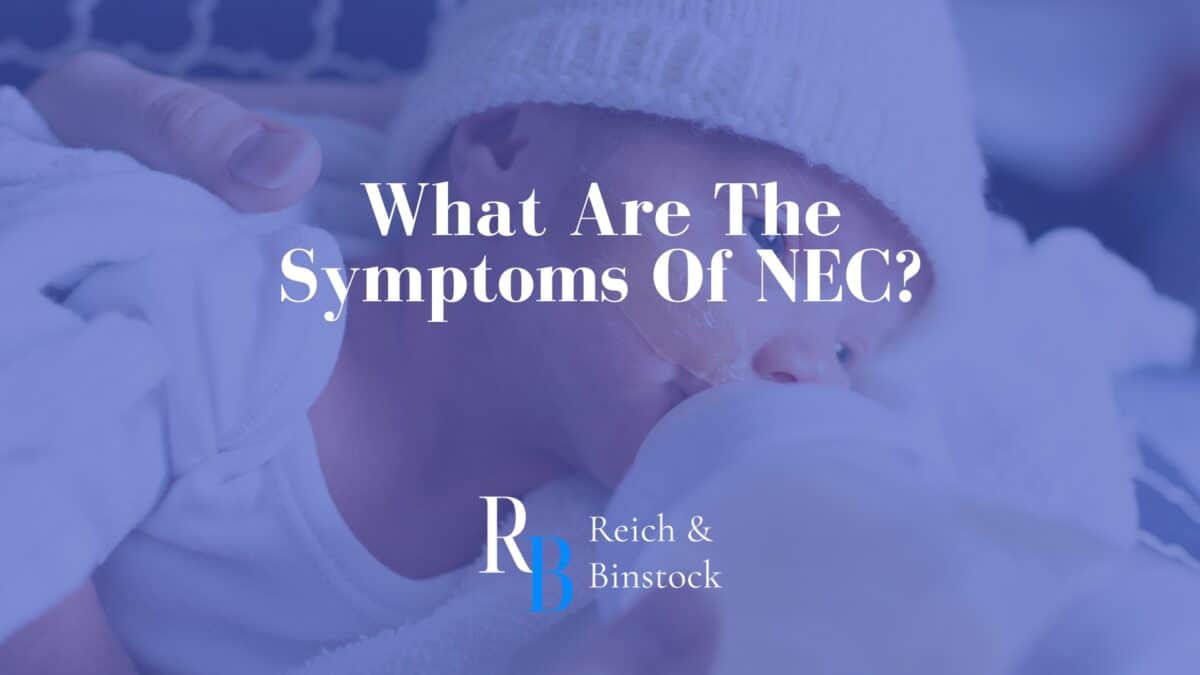Necrotizing enterocolitis, commonly called NEC, is a potentially fatal intestinal disease that inflames and then kills intestinal tissue. The symptoms of NEC can greatly harm babies, especially premature babies. Studies conducted in 2019 found that formula feeding premature infants almost doubles their risk of developing this disease.
Despite this information, Abbott Laboratories, the producer of Similac and Enfamil haven’t put any warning labels on their products, and are essentially ignoring the massive elephant in the room.
NEC can be a scary condition for parents to see their baby go through. While many infants can fully recover from necrotizing enterocolitis (NEC), many are also left with lasting complications.
In this post, we’ll explain what necrotizing enterocolitis (NEC) is as well as the symptoms of necrotizing enterocolitis, so that you can spot the condition and treat it as soon as possible.
If your baby was fed any cow’s milk-based formula and suffered stomach injuries or was diagnosed with necrotizing enterocolitis, the Houston personal injury attorneys at Reich & Binstock are here to answer any questions you may have. Our lawyers work on a contingency fee basis, so your initial consultation is free. Call us today at 713-622-7271.
What Is Necrotizing Enterocolitis (NEC)?

Necrotizing enterocolitis is a gastrointestinal condition that can affect premature infants. The most common characteristic of necrotizing enterocolitis is intestinal inflammation in infants. This intestinal inflammation can lead to the death of intestinal tissue and holes in the intestinal tract. Bacterial infections can then leak into the baby’s bloodstream through these holes.
This disease doesn’t typically develop until two to six weeks after the baby is born.
There are four main types of necrotizing enterocolitis that are characterized the specific symptoms of NEC, as well as the way the disease develops:
Classic Necrotizing Enterocolitis (Premature Infants)
Classic necrotizing enterocolitis (classic NEC) is most common in premature infants that are born before 28 weeks of pregnancy. This form of NEC comes without warning.
Term Infant Necrotizing Enterocolitis
Term infant necrotizing enterocolitis (term infant NEC) typically occurs in full term babies. More often than not, these infants have an underlying condition that makes them more susceptible to this type of necrotizing enterocolitis.
Transfusion Associated Necrotizing Enterocolitis
In certain, rare cases, a blood transfusion can cause necrotizing enterocolitis. Sadly, one in three infants develop transfusion-associated necrotizing enterocolitis within days of receiving the blood transfusion.
Atypical Necrotizing Enterocolitis
When a baby develops necrotizing enterocolitis within their first week of life or before their first feeding, this is known as atypical necrotizing enterocolitis (atypical NEC).
Causes of Necrotizing Enterocolitis
It’s estimated that 90% of infants that develop necrotizing enterocolitis were premature babies. But, being a premature infant isn’t the direct cause of NEC. This simply means that premature babies are more susceptible to this disease.
There is a 0.1% chance that a premature baby will develop NEC, while there is a 0.01%% chance that a full-term baby will develop the disease.
Symptoms of NEC

The symptoms of necrotizing enterocolitis range greatly. Babies can experience mild symptoms to symptoms that are life-threatening. For most infants, symptoms will show up within the first week or two, up to six weeks of life.
NEC Symptoms for Premature Babies
If your baby was born prematurely, here are some of the symptoms of necrotizing enterocolitis that you should watch for:
- Abdominal symptoms: pain, bloating, or swelling
- Cardiovascular symptoms: low blood pressure, low heart rate, trouble breathing, changes in body temperature, poor blood and oxygen circulation
- Digestive symptoms: diarrhea, bloody stools, green or yellow vomit
- Energetic symptoms: sluggish or lethargic
- Weight-related symptoms: poor feeding, refusal to eat, feeding problems, lack of weight gain
If you notice your baby exhibiting any of these symptoms or if you notice any decrease in human development, in general, call your child’s doctor immediately. The sooner a healthcare provider can get necrotizing enterocolitis diagnosed, the sooner your child can start receiving treatments.
Complications of NEC
While some babies who develop NEC recover fully, for some, the effects of necrotizing enterocolitis can last a lifetime, even after the baby has recovered from the infection.
Here are some of the possible complications of necrotizing enterocolitis:
Developmental Delays
Your child may experience delays in growth and development. Parents or the child’s provider should monitor the child very closely for signs of any developmental delays, and then find ways to give them the best support in that specific area for best results.
Intestinal Structures
Some children develop narrowed intestines after they have recovered from necrotizing enterocolitis. This alone can make it difficult for the baby to properly absorb nutrients, digest food and move nutrients through the baby’s belly.
You may wish to speak with a pediatric surgeon to address this issue.
Secondary Infection
Holes in the baby’s intestines present an array of risk factors. This decreases the baby’s ability to fight bacterial infections and can lead to further infection of the abdominal cavity. This is called peritonitis. If the abdominal cavity gets infected, this increases the risk of sepsis, which is a life-threatening blood infection.
Short Bowel Syndrome or Short Gut Syndrome
Because of the damage to the abdominal wall, some babies develop what’s called “short bowel syndrome.” This means that it will be difficult for the baby’s body to absorb nutrients. This condition will require very strict precautions and in severe cases, you will need to use a nasogastric tube (a specific type of feeding tube).
Necrotizing Enterocolitis Lawsuit

We now know that formula feeding can lead to necrotizing enterocolitis. If your baby was fed formula, especially in one of the hospital’s neonatal intensive care units, then you may be able to pursue legal action against the baby formula companies.
Both major baby formula producers, Similac and Enfamil, are facing several lawsuits across the United States. Scientists believe the link exists between a cow’s milk in their formula and NEC development for both premature and full term infants.
Dangerous Baby Formulas With Pending Lawsuits
So, what formula causes NEC? The following baby formulas are currently at the forefront of several pending product liability lawsuits:
- Enfamil 24 Cal Infant Formula
- Enfamil Human Milk Fortifier
- Enfamil NeoPro EnfaCare Infant Formula (According to Mead Johnson, this is the “best” for premature birth.)
- Enfamil Premature Infant Formula 24 Cal High Protein
- Enfamil Premature Infant Formula 20 Cal with Iron
- Enfamil Premature Infant Formula 24 Cal with Iron
- Enfamil Premature Infant Formula 30 Cal with Iron
- Similac Alimentum Expert Care
- Similac Human Milk Fortifier
- Similac Human Milk Fortifier Hydrolyzed Protein Concentrated Liquid
- Similac Liquid Protein Fortifier
- Similac NeoSure
- Similac Special Care 20
- Similac Special Care 24
- Similac Special Care 24 High Protein
- Similac Special Care 30
NEC Injury Lawyers
As a parent, you never want to see your baby suffer. For some preemies, necrotizing enterocolitis creates a tough road for the rest of the child’s life. At Reich & Binstock, we sincerely urge new parents to watch for signs of NEC and contact a healthcare provider the minute you notice anything “off”. You know your baby better than anyone, so trust your gut. You can never be too careful with little ones!
If you believe that your infant was affected by necrotizing enterocolitis after being fed baby formula, you may be able to seek financial compensation for your losses against these willfully negligent baby formula companies. Holding corporations, like Enfamil and Similac, accountable is the best way to protect babies in the future.
Contact one of our experienced Houston product liability attorneys for a free consultation by calling 713-622-7271. All of our lawyers work on a contingency fee basis, so you won’t pay anything unless your claim is successful.














